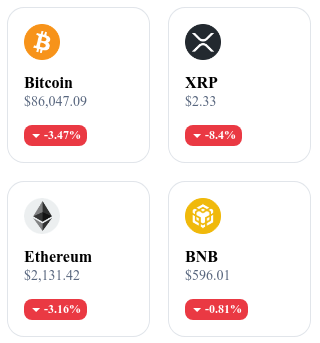🇷🇺 Putin supports Bitcoin, but refuses to follow Trump!
Welcome to the Saturday Daily Tribune on March 8, 2025 ☕️
Happy New Year to Cointribu! 🚀
Today is Saturday, March 8, 2025, and like every day from Tuesday to Saturday, we summarize the news from the last 24 hours that you shouldn't miss!
But first…
✍️ Cartoon of the day:
A quick look at the market…
🌡️ Temperature:
Rainy 🌧️
24h crypto recap! ⏱
🇷🇺 Putin supports Bitcoin but rejects Trump's approach!
While Donald Trump wants to make Bitcoin a state asset, Vladimir Putin adopts a very different approach. Russia recognizes the technological value of Bitcoin, but refuses to integrate it into its national reserves, preferring gold and the yuan. The National Wealth Fund (NWF), which manages $122 billion, prioritizes financial stability, and the Kremlin believes that cryptos are too speculative. However, Russia is quietly using Bitcoin to circumvent sanctions, while pushing blockchain infrastructures to modernize some strategic sectors. 🔗 Read the full article
🛠 Ethereum creates a "shadow fork" after the Holesky testnet fiasco!
The Pectra update, aimed at improving Ethereum, encounters a major setback after the failure of the Holesky testnet, which has been down since February 24. To avoid further delays, developers decided to create a "shadow fork", a clone of the network that will allow for testing Pectra in parallel. This approach had already been used before The Merge in 2022. However, some DeFi applications (Aave, Lido) may not be compatible. 🔗 Read the full article
💪 Solana continues to compete with Ethereum despite the memecoin crisis!
Despite the collapse of memecoins, Solana maintains impressive DEX trading volumes, capturing 30% of the market, just behind Ethereum (40%). In February, Solana briefly surpassed Ethereum in the decentralized exchanges (DEX) sector, notably due to Pump.fun and the TRUMP and LIBRA tokens. However, the decline of the latter caused an 80% drop in stablecoin transactions on Solana. Despite this, Raydium (Solana's main DEX) still shows $1.3 billion in TVL, and the blockchain records a 191% increase in SOL since January. Solana's future will depend on its ability to attract institutions beyond the memecoin market. 🔗 Read the full article
📉 NFTs plunge with the crypto market!
NFTs, once the stars of Web3, are in free fall: their market capitalization has shrunk by 90% since 2021, and their trading volume has dropped by 50% in February, falling to $498 million. The profile NFT market generated $243 million, but at prices much lower than in 2021. Only a few projects like Doodles on Solana and Kaito Genesis (AI and NFT) are trying to revive the hype. The Trump Organization could also revitalize the market by launching a metaverse coupled with NFTs, but for now, the trend is clearly bearish. 🔗 Read the full article
Today's crypto: Ethena (ENA)
Ethena is a decentralized finance (DeFi) protocol that aims to provide a crypto-native solution for a stable currency, without relying on traditional banking infrastructure. The protocol also introduces a USD-denominated savings instrument, globally accessible, called "Internet Bond".
Ethena's native token, ENA, is used within the protocol for various functions, including participation in governance and potentially staking. ENA holders can influence decisions regarding the protocol's evolution, giving them a voice in the project's future direction. The initial distribution of ENA was conducted at launch, with a total supply of 15 billion tokens.
Recent performance:
Current price: $0.4434 (approximately €0.42)
24-hour change: +8.1%
Market capitalization: $2.34 billion
Rank on CoinMarketCap: #57
Beijing injects billions: An unexpected boost for Bitcoin?
While the focus was on the United States and their strategic reserve of Bitcoin, China could trigger a major economic earthquake. Beijing recently announced a massive liquidity injection of $1.4 trillion to support its economy, a measure that could indirectly benefit Bitcoin and cryptocurrencies. This initiative aims to stabilize the yuan and circumvent US economic sanctions, amid growing geopolitical tensions with Washington.
Could Chinese liquidity flow into Bitcoin?
China has previously used monetary stimulus policies to stabilize its domestic market, but the impact of these liquidity injections goes well beyond Chinese borders. In 2015 and 2020, part of the released capital was directed toward alternative assets, including Bitcoin. This time, experts believe that history could repeat itself, with a potential influx of funds into the cryptosphere.
"When China tightened its monetary policy and injected liquidity, these funds were often redirected toward alternative assets" – Nexo
If this capital finds its way to Bitcoin, it could create massive bullish pressure on the market and accelerate its institutional adoption.
Will Beijing build a strategic reserve of Bitcoin?
A persistent rumor circulates within the crypto industry: China could also store Bitcoin. According to David Bailey, CEO of Bitcoin Magazine and advisor to the Trump campaign on cryptos, secret discussions have taken place in Beijing on this topic.
If this hypothesis were confirmed, China would outpace the United States, where Donald Trump recently proposed to create a national reserve of Bitcoin. Beijing could then use BTC as a strategic tool to counter US economic restrictions and diversify its reserves against a dominant dollar.
A geopolitical repositioning around Bitcoin?
Arthur Hayes, co-founder of BitMEX, predicts an unprecedented monetary restructuring, where Bitcoin would play a key role in the balance of global economic powers. He believes this transformation could push Bitcoin beyond a million dollars, especially if China and other major powers start accumulating BTC massively.
"Watch out for China. The global economy could soon enter a phase of monetary reflation that would propel Bitcoin to unprecedented heights." – Arthur Hayes
If Beijing embarks on mass Bitcoin purchases, this would create an extreme scarcity dynamic, pushing prices to record levels and completely rewriting the balance of global currencies.
The outcome of this monetary war remains uncertain, but one thing is clear: Bitcoin is no longer just a speculative asset; it is becoming a strategic issue in the standoff between global powers.









